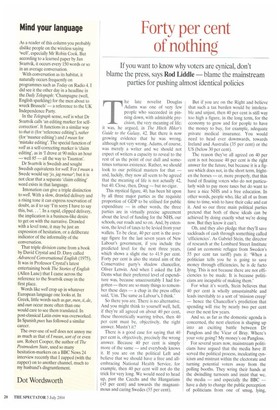Mind your language
As a reader of this column you probably dislike people on the wireless saying 'well', especially Mr Robin Cook. But according to a learned paper by Jan Svartvik, it occurs every 150 words or so in an average conversation.
With conversation as its habitat, it naturally occurs frequently on programmes such as Today on Radio 4. I did see it the other day in a headline in the Daily Telegraph: 'Champagne (well, English sparkling) for the men about to wreck Brussels' — a reference to the UK Independence Party.
In the Telegraph sense, well is what Dr Svartvik calls 'an editing marker for selfcorrection'. It functions in a similar way to that is (for 'reference editing'), rather (for 'nuance editing') and I mean for 'mistake editing'. The special function of well as a self-correcting marker is 'claim editing', as in 'I drove at 90 miles an hour — well 85— all the way to Taunton'. Dr Svartvik is Swedish and sought Swedish equivalents for well. For I mean a Swede would say jo, jag menar'; but it is not clear that a separate 'claim editing' word exists in that language.
Intonation can give a triple distinction to well. With a slow, drawled delivery and a rising tone it can express reservation of doubt, as if to say 'I'm sorry I have to say this, but. .. In a rapid, clipped delivery, the implication is a business-like desire to get on with the narrative. Drawled with a level tone, it may be just an expression of hesitation, or a deliberate indicator of the informality of the conversation.
That triple division came from a book by David Crystal and D. Davy called Advanced Conversational English (1975). It was in Professor Crystal's latest entertaining book The Stones of English (Allen Lane) that I came across the reference to the Svartvik essay in the first place.
Words like well crop up in whatever European language one looks at. In Greek, little words such as gar, men, ti, de, and oun occur more often than one would care to see them translated. In post-classical Latin enim was overworked. In Spanish pues has followed a similar career.
The over-use of well does not annoy me as much as that of I mean, sort of or even um. Robert Cooper, the author of The Postmodem State, used so many hesitation-markers on a BBC News 24 interview recently that I zapped (with the zapper) on to another channel, much to my husband's disgruntlement.
Dot Wordsworth


































































 Previous page
Previous page